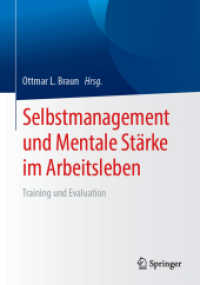- ホーム
- > 洋書
- > 英文書
- > Religion / Ethics
Full Description
In Ambrose's church in Milan, Augustine realized how a Catholic bishop could oppose the power of the Roman emperor and establish the church as both independent and pre-eminent. Once he realizes for the first time that the authority of a Catholic bishop could successfully oppose the pretensions of an emperor who, clearly, only had limited and by no means absolute secular power, he began to consider the possibility of a society utterly transformed from its present conditions. The state and its head were both vulnerable. The emergence of Catholicism at the end of the fourth century could provoke, challenge, and resist the edicts of an emperor made more and more vulnerable precisely by his worldly power. The fragility of the emperor reflected the tenuous and always shifting borders of a state; faith and the spirit had no such borders. Augustine had the audacity to imagine the church ultimately subsuming the state into itself. But this early perception changed. By the end of his life, Augustine's hope for a spiritual regeneration of the social world was ultimately relinquished, replaced with the division of the two cities, Jerusalem and Babylon, separate and never to be joined, each with its own legitimacy. The self-possessed youth fundamentally in opposition to Roman society had accepted the division of the two cities and therefore the impossibility of a spiritual regeneration of the world. Augustine, the individual of his autobiography, was finally if not irrevocably relinquished to become the adopted son of the church; in so doing, he could not reconcile the self-division that had formed him - the double-inheritance of his North African birth as Adamic and Roman. If, at the beginning of his ordination into the priesthood and the hopeful first few years of his leadership, he believed that human beings could be "conformed to the image of God through the rebirth of the renewed man ... and these things can be realized even in this life," by 412 he had definitively turned away from any such aspirations and instead chose to divide the two cities. He had, in the end, resigned himself. Instead of the regeneration of human beings and the world, Augustine accepted the respective identities and the separation of Jerusalem and Babylon and, by doing so, determined both his personal belief and the future of the Catholic church. This is how that came about.





